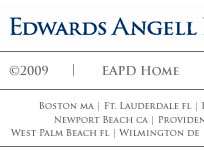
Court of Appeal Upholds OFT's Right to Assess the Fairness of Bank Charges
On 26 February 2009 the Court of Appeal dismissed the appeal of seven banks and the Nationwide Building Society (the Banks) against the decision of the High Court that the Office of Fair Trading (OFT) was entitled to assess the fairness of certain customer charges.
The decision in Office of Fair Trading v Abbey National Plc [2008] EWHC 875 (Comm) (OFT v Abbey) sets an important precedent that could potentially have significant implications for the banking industry. The bank charges in question in OFT v Abbey are those imposed by the Banks when their current account customers went into unauthorised overdraft. It is estimated that the Banks use these charges to generate around £3.5billion a year in income and with thousands of claims by disgruntled customers on hold pending the result of OFT v Abbey, the Banks face huge potential liabilities.
History
In the face of growing public concern about the nature and size of the charges issued by the Banks, the OFT began a formal investigation into the fairness of such charges. An objection was raised claiming that the relevant charges should not be subject to assessment in accordance with the Unfair Terms in Consumer Contract Regulations 1999 (the Regulations). The OFT issued proceedings against the Banks and sought a declaration that the standard terms and charges in question were not excluded from assessment under the Regulations and that accordingly they could be assessed by the OFT. The OFT also claimed that these charges were penalties for breach of contract and as such had to reflect their true administrative cost.
The Banks argued that such an assessment was excluded by Regulation 6(2)(b) which provides that:
"in so far as it is plain intelligible language, the assessment of fairness of a term shall not relate-
(a) to the definition of the main subject matter of the contract, or
(b) to the adequacy of the price or remuneration, as against the goods or services supplied in exchange."
The Banks argued that the language of the terms was plain and intelligible and that the application and effect of the relevant charges was not, as argued by the OFT, unapparent to the typical customer.
The Banks claimed that in light of this, an assessment of the fairness of the charges was excluded either on the basis that these charges were part of the price or remuneration the customer agreed to pay for the entirety of services provide by their bank or, in the alternative, that each charge was the price or remuneration paid by the customer for a specific service provided by their bank prior to the application of the charge.
If it were held that these terms were not exempt under Regulation 6(2)(b), the next step would be for the OFT to determine whether the charges were in fact unfair. Regulation 5(1) provides that:
"a contractual term which has not been individually negotiated shall be regarded as unfair if, contrary to the requirement of good faith, it causes a significant imbalance in the parties' rights and obligations arising under the contract, to the detriment of the consumer".
Faced with the possibility that the Court would hold that the OFT had the right to assess the charges, as well as the possibility of facing the numerous potential claims brought by their customers, the Banks in turn sought declarations that:
"i) it is a necessary, but not a sufficient, precondition to any finding of unfairness under Regulation 5(1) to the 1999 Regulations that the contractual terms under consideration are contrary to the requirement of good faith.
ii) The Relevant [Bank] Terms and Relevant [Bank] Charges could not be found to be unfair within the meaning of Regulation 5(a) of the 1999 Regulations by virtue of giving rise to a significant imbalance in the rights and obligations of the parties, without reference to the issue of good faith.
iii) If the OFT seeks any relief from the Court based upon a contention that the Relevant Terms and Relevant Charges are unfair within the meaning of Regulation 5(a) of the 1999 Regulations, one of the matters which it will have to establish is that the Bank has not dealt fairly and openly with its customers as regards the process by which the Relevant [Bank] Charges were agreed by [or otherwise became part of the contract between] the Bank and its customers."
In relation to the OFT's argument that the charges amounted to penalties under common law, the Banks argued they were not capable of classification as such, as the incursion of a charge by a customer was not dependent upon a breach of contract by that customer and sought a further declaration to that effect.
The Court at first instance held that it was unlikely that a bank and its customer would provide in their contract that the customer would be in breach of contract whenever the customer became overdrawn. It was accordingly held that the relevant terms used by the Banks were not penalty clauses as the charges were payable on events other than breaches of contract and were thus enforceable at common law.
However, on the issue of potential exclusion of the terms from assessment by the OFT, Andrew Smith J. held that even though he felt that the language of the terms was in fact plain and intelligible (with minor exceptions) the charges were not exempted from assessment on the basis that they were not the "core terms" of the agreements between the Banks and their customers. That is to say that they were not part of the essential bargain between the parties and were merely ancillary payments that were not part of the main subject matter of the agreements.
The Banks' alternative argument, that the charges were payments for specific services, was also rejected. The Court was not convinced by the argument that when a bank processes but fails to make a customer's payment in accordance with its instructions, it is providing a specific additional service to that customer.
The Court also declined to make any declaration regarding the meaning and effect of the good faith requirement of Regulation 5(1).
The Appeal
The Banks appealed the decision to the Court of Appeal. However the Court of Appeal dismissed the appeal holding that the High Court had been correct in its interpretation of Regulation 6(2)(b) and that it was intended to give effect to the equivalent provision of the European Union Council Directive 93/13/EEC, article 4(2). The Court indicated that article 4(2) sought to exclude from assessment of the fairness of a term in a consumer contract, the core bargain or price as it was likely that the parties would negotiate the relevant main terms to the agreement but not those that were merely peripheral. The fact that the terms in question were contingent on the occurrence of certain events and were not specifically negotiated were strong indicators that they were merely peripheral and therefore not excluded from assessment.
What Does This Mean?
In theory this decision opens the way for thousands of claims, worth potentially billions of pounds, to be made by customers across the country against the Banks. This in itself is likely to have a knock-on effect in terms of how banks raise income.
The Court of Appeal refused the Banks' application for permission to appeal. However, in light of the significance of the point of principle in dispute and in anticipation of the Banks applying to the House of Lords for permission to bring a further appeal, thousands of claims brought by customers remain on hold.
Comment
It is important to remember that this recent decision only relates to whether the OFT has the right to assess the fairness of the charges and does not relate to whether any of the charges which are the subject matter of claims are in fact unfair.
As anticipated, the Banks petitioned the House of Lords for permission to appeal the decision and the hearing was held in the last week of June 2009 at which permission was granted. banking institutions and customers alike will no doubt await the decision on this important point of principle with interest. Victory for the OFT is likely to bring an influx of new claims in addition to the continuation of those currently stayed by the Court.
It remains to be seen how the Banks will react to public opinion on this issue and the litigation which has ensued and whether customers will in fact ultimately benefit.
Contacts
The information in this newsletter is for general guidance only and is not intended to be a substitute for specific legal advice. If you would like any further information please contact:

Henry Stewart
Associate, Commercial Litigation - London
t: +44 (0) 20 7556 4479
e: HStewart@eapdlaw.com









